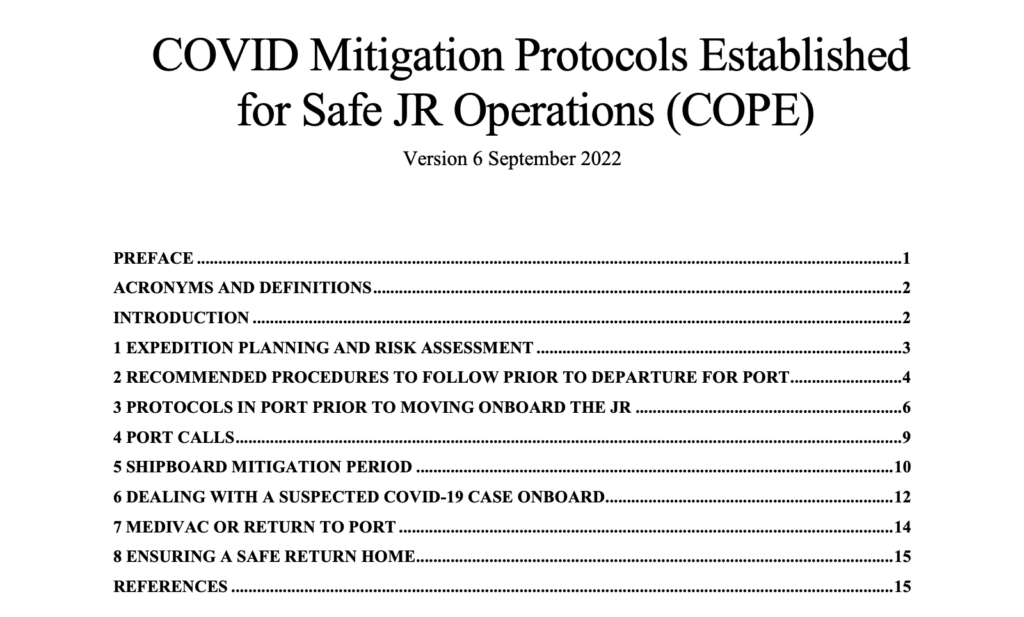
COVID on Deck (Part 2: The New Normal)
 This post was written by IODP Manager of Science Operations, Dr. Katerina Petronotis, to respond to my question of how IODP decided to operate during the first two years of the COVID-19 pandemic.
This post was written by IODP Manager of Science Operations, Dr. Katerina Petronotis, to respond to my question of how IODP decided to operate during the first two years of the COVID-19 pandemic.
The COVID-19 pandemic created extreme travel and health restrictions starting in Spring 2020. Some ship’s crew were restricted to their home countries. Panama and then European restrictions resulted in JRSO staff working for 75 days until they could rotate off in May 2020, and Siem crew working for >100 days until they could be replaced in June 2020.
The JRSO’s initial response was to continue to plan expeditions until it was clear we could not implement them due to logistics or safety. At the same time we started developing a COVID protocol for safe operations since we were one of very few scientific ships that were continuing to operate. This protocol is still in use today and continues to evolve as COVID-19 evolves.
In summer 2020, it became clear that we could not conduct complex expeditions with scientists on board and the JOIDES Resolution Facility Board (JRFB) made the decision to postpone Expeditions 390, 391, 392, and 393. This was a blow to those scientists as it meant waiting at least another year to sail.
Although we could not have scientists sail due to all the travel restrictions and health risks, we thought we would be able to sail with some of our staff. So we examined whether we could conduct engineering-focused operations to save time on future expeditions. Because of the time needed to obtain clearance, we were also limited to operations in international waters. As a result, between July 2020 and June 2021, we were able to conduct operations that included targeted coring and the installation of several re-entry systems for 2022-2023 expeditions.
However, health concerns, travel restrictions, flight availability, closed consulates and inability to obtain visas continued to be problems in 2021. The Expedition 395 co-chiefs decided to postpone Expedition 395 yet again. Instead, Expedition 395C sailed only with technical staff and the expedition project manager, and completed the crustal objectives coring, leaving the paleoclimate objectives for summer 2023.
The availability of COVID vaccinations in the spring and summer of 2021 improved our ability to operate. In August-September 2021, Expedition 396 sailed with about half the science party to ensure everyone had their own cabin in case they had to isolate, and was very successful.
In December 2021, Expedition 391 sailed with a slightly reduced science party because the emergence of the Omicron variant kept some scientists at home. Unfortunately, despite our COVID protocol, the expedition lost 18 operational days due to an outbreak on board. Expeditions 392, 390, and 393 followed in the spring and summer of 2022 with only a few scientists not being able to sail. Furthermore, Expeditions 390 and 393 benefited from the earlier 2020-2021 coring and reentry operations.
We continue to follow COVID mitigation measures such as testing and masking, but as variants become more contagious and countries drop their restrictions, the big question becomes when we can start treating COVID as an endemic disease. The answer is not clear but as herd immunity expands and COVID variants are perhaps becoming less deadly, we are hopeful that future expeditions will be unaffected by COVID-19.